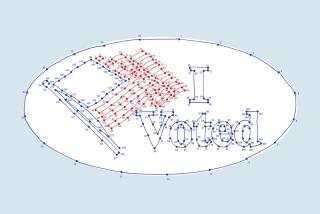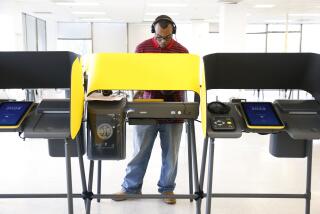Make Fairness a Primary Goal
- Share via
California finally did get some presidential primary clout this year by moving its election to March 7. But with so many primaries so early, the suspense was over nationally on March 8, and a lot of states ended up--again--with no say in the selection process. The best proposed remedy comes from California Secretary of State Bill Jones and his 49 fellow state elections officials, who are calling for a series of four regional primaries held every presidential election year, beginning in March and ending in June. The order of the four regions would be rotated for each election, so every state would have an opportunity to go first.
In years past, Californians watched from the sidelines as the winners of the major party nominations were decided in states that voted before this state’s traditional June balloting. California moved its primary up to the third week in March in 1996, then again to March 7 for the 2000 election, the earliest possible date under party rules, except for the Iowa caucuses and the New Hampshire and South Carolina primaries. Then more states, fearing they’d be left out, jumped forward to March 7 as well--11 state primaries and five caucuses in all on that date. California had a role in making Al Gore and George W. Bush the Democratic and Republican nominees, but it was not especially decisive.
The situation could become ludicrous in 2004. As Jones joked: “If we end up with primaries in Christmas 2003, someone is going to ask how this happened.” But there’s no doubt that even more states will schedule their primaries at the start of the primary season, guaranteeing a general election battle eight months long.
Both national parties have task forces studying the matter. For Republicans, only the national convention has the power to change party rules. If that’s not done this summer, the issue will have to wait four years. A commission led by former Tennessee Sen. Bill Brock is studying several proposals to forward to the convention’s rules committee. Democrats have more time because their rules can be changed by the Democratic National Committee.
Even if the parties act this year, the various state legislatures will have to change their election laws to conform, if they agree to go along. The parties will probably have to enact some penalties to make sure the states do so. One way is to deny any maverick state a considerable number of their convention delegates.
Without action, primary election day in March of 2004 will tilt even more strongly toward well-known, heavily financed establishment candidates. That would be little better than the hand-picking of nominees by bosses in smoke-filled rooms, just like in the bad old pre-primary days.
More to Read
Get the L.A. Times Politics newsletter
Deeply reported insights into legislation, politics and policy from Sacramento, Washington and beyond. In your inbox twice per week.
You may occasionally receive promotional content from the Los Angeles Times.










